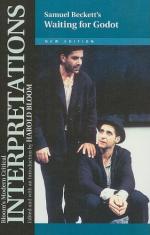|
This section contains 5,892 words (approx. 20 pages at 300 words per page) |

|
SOURCE: Mayoux, Jean-Jacques. “The Theatre of Samuel Beckett.” Perspective 11, no. 3 (autumn 1959): 142-55.
In the following essay, translated from the French version originally published in the October 1957 issue of Etudes Anglaises, Mayoux highlights Beckett's “laying open” the essence of human existence in Waiting for Godot, Endgame, All That Fall, and The Unnamable.
I. an Overall View
I shall assume, in order to save time and space, that Samuel Beckett is well-known as a fifty-three year old Irishman who, in the last thirty years or so, has written admirably in two languages: poems, essays, fiction. His turning towards the theatre in about 1950 was probably due in part to expediency and perhaps to necessity, for the theatre, through visible but illusory forms, presents us with an unreal reality, a make-believe action. Those who have ceased to believe in reality, readily compare it to a theater, and foremost among them is Epictetus...
|
This section contains 5,892 words (approx. 20 pages at 300 words per page) |

|


